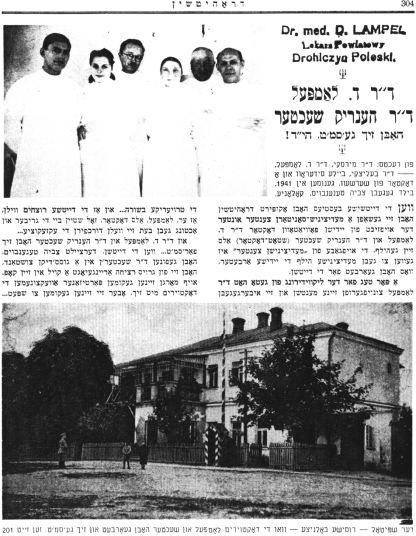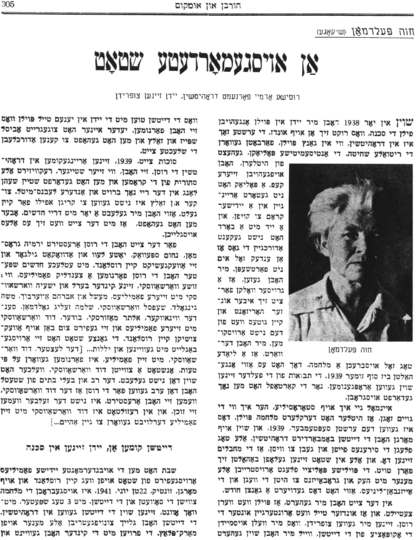Previous Page |
Next Page

[Page 304]
Dr. D. Lampel
Dr. Henrik Schechter
They poisoned themselves! May G-d avenge their blood!
[photo:] From right: Dr. Mirsky, Dr. D. Lampel, Dr. Belitsky, Beila Siderov and a doctor from Shershev. The photo was taken in 1941 and provided by Zvia Tennenbaum of Kolonia.
[photo:] The hospital – a Russian hospital – where Drs. Lampel and Schechter worked and poisoned themselves. See p. 201.
When the German savages occupied Drohitchin, they set up a medical center under the direction of the Jewish doctors, D. Lampel and Henrik Schechter (city doctor) as his assistant. The job of the medical center was to provide medical assistance to Jewish workers who worked for the Germans.
A couple of days before the liquidation of the ghetto, Dr. Lampel called together his staff and told them the tragic news that the German murderers wanted him to stand next to the trenches and oversee the executions. Both doctors poisoned themselves. According to the Zvia Tennenbaum, when the Germans found Dr. Schechter half-dead, they shot him in the head. The next day partisans arrived to take the doctors with them, but they arrived too late.

[Page 305]
Chava Feldman (Chicago)
[photo:] Chava Feldman
A MASSACRED TOWN
The Russian army takes Drohitchin, and the Jews are pleased
As early as 1938, we Jews in Poland began sensing the danger that was moving in our direction. The first thing that was prohibited, both in Drohitchin and the rest of Poland, was ritual meat slaughter. Incited by Hitler, the anti-semitic Poles raised their heads. A Pole wouldn't dare enter a Jewish store, and a Jew with a beard was unable to walk on the street for fear of being harassed. We could tell that a large cloud was covering the horizon, and nothing good would come of it. We expected that war would break out any day, and this feeling remained until the end of the summer of 1939. The harvest had already been gathered, and only the potatoes still needed to be dug up.
I once went to the end of Starosilia and heard gentiles saying that Hitler had declared war on Poland. This was on September 1, 1939, and the very next day the Germans bombed Drohitchin. The air-raid sirens wailed the entire day to tell us that the terrorists were here. Everyone in town went to find somewhere to hide and thereby stay alive. The Polish police forced all the men to guard the roads and railroad with axes and mattocks. This lasted for an entire month.
We then heard that Poland was to be partitioned, and that our section would be under the Russians. We were happy about avoiding German occupation because we had already heard about what the Germans were doing to the Jews in the areas they were occupying. Each one of us prepared some food and salt, and hope we'd get through the difficult period.
During Sukkot, 1939, the Russians arrived in Drohitchin. As was their custom, they requisitioned all the stock from the stores, and we had to stand in line for hours for bread and other food. There was no sugar or salt to be had for any money. We lived this way for fifteen months. However, we hoped that things would eventually work out.
The Russians arrested Yirmiyahu Grossman, Nachum Spevak, Yasha Lev and attorney Gilgore, and sent them to Russia. A few months later, the Russians sent off a number of people and their families to Russia: Zusha Warshavsky, his children Berl and Yeshayahu Warshavsky and their families; Meshel and Avraham Averbuch, Moshe Gingold, Shepsel Warshavsky, Shlomo Zelig Goldmann, Sender Vinocur, Alter Mazursky, Buder, David Warshavsky and their families. The entire town accompanied them mournfully (the last one, David Warshavsky, and his family were taken away through an error. He was confused with another David Warshavsky, who was deceased. The rabbi and businessmen in town testified on behalf of David to the Russians that the person they arrested was not the person they were looking for, so David was eventually allowed to return home).
Germans arrive, Jews are in danger
The aforementioned Jewish families were taken from town to Russia on the Sabbath, and the following day, Sunday, June 22, 1941, the war between the Soviets and the Germans broke out. Three days later, on Wednesday evening, the Germans were already in Drohitchin. The Germans got all the men together at the marketplace. The women and children cried and fainted, thinking that everyone was going to be killed.
Previous Page |
Next Page
This material is made available by JewishGen, Inc.
and the Yizkor Book Project for the purpose of
fulfilling our
mission of disseminating information about the Holocaust and
destroyed Jewish communities.
This material may not be copied,
sold or bartered without JewishGen, Inc.'s permission. Rights may be
reserved by the copyright holder.
JewishGen, Inc. makes no representations regarding the accuracy of
the translation. The reader may wish to refer to the original material
for verification.
JewishGen is not responsible for inaccuracies or omissions in the original work and cannot rewrite or edit the text to correct inaccuracies and/or omissions.
Our mission is to produce a translation of the original work and we cannot verify the accuracy of statements or alter facts cited.
 Drogichin, Belarus
Drogichin, Belarus
 Yizkor Book Project
Yizkor Book Project
 JewishGen Home Page
JewishGen Home Page
Yizkor Book Director, Lance Ackerfeld
This web page created by Lance Ackerfeld
Copyright © 1999-2024 by JewishGen, Inc.
Updated 13 Dec 2001 by LA


 Drogichin, Belarus
Drogichin, Belarus
 Yizkor Book Project
Yizkor Book Project
 JewishGen Home Page
JewishGen Home Page